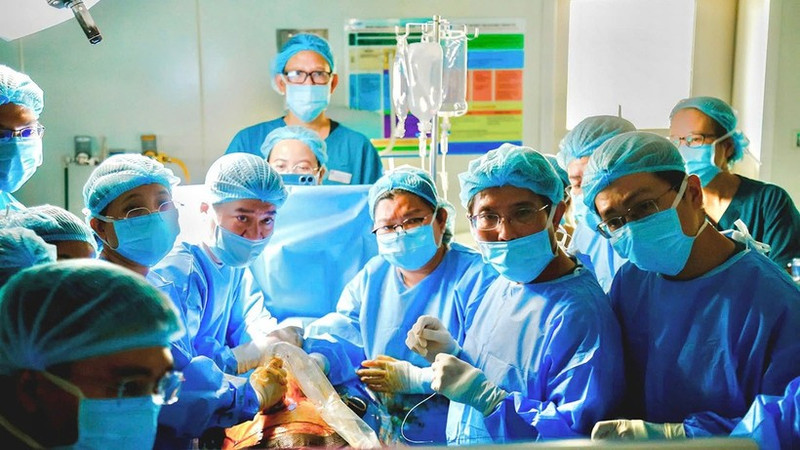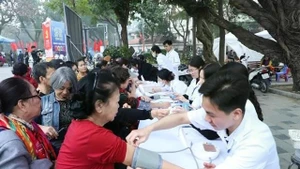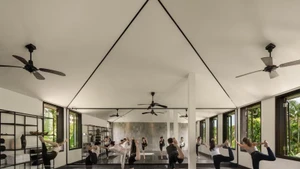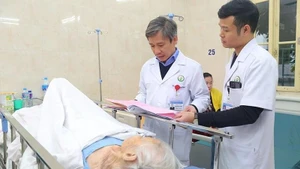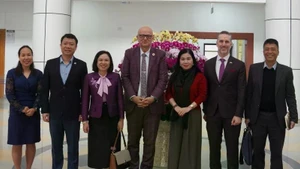This effort aims to improve healthcare service quality for the public and affirm the international position of Viet Nam’s medical sector.
According to the Ho Chi Minh City Department of Health, leading hospitals have mastered complicated specialised techniques in key specialties such as obstetrics, surgery, paediatrics, and oncology. A recent notable case was a urethral reconstruction surgery for a US patient performed at Binh Dan Hospital in May 2025. The successful surgery ended 15 years of discomfort caused by urethral stricture for the patient.
“We performed the surgery in two hours. Three weeks later, the patient returned for a follow-up, and his urination function had fully recovered. Before this American case, the hospital had successfully operated on more complex urethral stricture cases,” said Dr. Do Lenh Hung, Head of the Department of Urethral Reconstructive Surgery at Binh Dan Hospital, who directly performed the surgery.
Binh Dan Hospital has received over 1,000 international patients for medical examination and treatment since 2023, marking a significant milestone in specialised urological techniques. In addition to mastering advanced technology, medical staff members here regularly share expertise and transfer robotic laparoscopic surgery techniques to domestic and foreign hospitals.
In the field of obstetrics and gynaecology, Tu Du Hospital and Children's Hospital 1 successfully collaborated on a foetal heart intervention for a Singaporean pregnant woman, marking an outstanding achievement for Vietnamese medicine.
The case, involving a foetus at only 25 weeks and weighing less than 600 grams with a rare congenital defect, had been referred to Viet Nam by Singaporean medical specialists. According to leading doctors, this was the most complex surgery of its kind ever. The surgery lasted six hours with two interventions. The successful surgery made a splash in the international medical community and received high praise from the leaders of the Ministry of Health.
“We not only have skilled doctors, but also master modern technologies. This success has not come by chance, but it is the result of persistent efforts in human resource training, equipment investment, and international cooperation,” affirmed Nguyen Van Duoc, Chairman of the Ho Chi Minh City People’s Committee.
Developing specialised medicine is a key direction of the healthcare sector, clearly defined in Resolution No. 31-NQ/TW issued on December 30, 2022 by the Politburo on the development direction and tasks for Ho Chi Minh City until 2030, with a vision to 2045. The resolution identifies core tasks such as: investing in integrated infrastructure, building modern hospitals, expanding services based on specialised medical clusters; developing high-quality medical human resources, standardising training, and developing leading medical disciplines; strongly applying digital transformation and smart healthcare. On this basis, the Ho Chi Minh City People’s Committee has issued a project to develop Ho Chi Minh City’s healthcare system into a regional ASEAN healthcare hub from now until 2030 and beyond. The project is expected to generate socio-economic benefits, improve health, stature, life expectancy, and quality of life for the public. Meanwhile, specialised medical centres will be positioned to develop medical tourism and attract international patients for treatment and care.
Apart from mastering many specialised techniques, hospitals in Ho Chi Minh City are also focusing on improving service quality in line with international standards and certifications. In 2024, Hung Vuong Hospital became the first public medical facility in the city to achieve international accreditation from the Australian Council on Healthcare Standards (ACHS).
According to Dien Ngoc Trang, Head of the Quality Management Department at Hung Vuong Hospital, meeting this standard required genuine improvements in daily clinical practices.
“We first conducted self-assessments to determine which criteria were met and which were not, then took specific action. Specialised monitoring teams were formed to monitor progress applied at each job position, helping to confirm that the standards are not only on paper but also present in practice,” Trang shared.
The Ho Chi Minh City Department of Health considers its annual hospital ranking system as a critical benchmark for evaluating quality and helping facilities make necessary adjustments. All efforts are directed towards one goal: improving the quality and effectiveness of healthcare services for the people.
“These quality evaluations of hospitals generate a positive energy that contributes to improving public satisfaction with the healthcare sector. Moreover, top-rated hospitals such as Binh Dan, Nhan Dan Gia Dinh, Children’s Hospital 1, and Hung Vuong Hospital reflect the effectiveness of the city’s public investment policies in medical infrastructure since 2020,” said Nguyen Phuoc Loc, Deputy Secretary of the Ho Chi Minh City Party Committee and Chairman of the Ho Chi Minh City Fatherland Front Committee.
With a population of about 14 million, Ho Chi Minh City is a mega-urban centre with diverse and specialised healthcare needs. This requires the health sector to constantly innovate, improve professional quality, and enhance its capacity to apply high technology in diagnosis and treatment. Fully aware of this, the city’s healthcare sector is actively concretising goals and solutions in accordance with the spirit of Resolution No. 57-NQ/TW issued on December 22, 2024 by the Politburo, on breakthroughs in science, technology development, innovation, and national digital transformation. This is a guiding principle for Ho Chi Minh City to take firm steps to develop a deeply specialised, modern, and internationally integrated medical sector.
